

Declaration for the Right to Libraries - Text Only. Declaration for the Right to Libraries In the spirit of the United States Declaration of Independence and the Universal Declaration of Human Rights, we believe that libraries are essential to a democratic society.
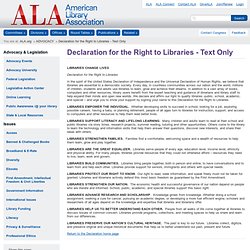
A Tale of Two Students. Meet Michael.
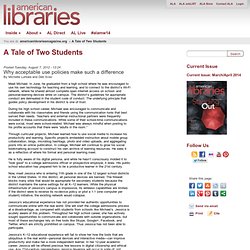
In June, he graduated from a high school where he was encouraged to use his own technology for teaching and learning, and to connect to the district’s Wi-Fi network, where he shared almost complete open internet access on school- and personal-learning devices while on campus. The district’s guidelines for appropriate conduct are delineated in the student code of conduct.
The underlying principle that guides policy development in his district is one of trust. During his high school career, Michael was encouraged to communicate and collaborate with his classmates and friends using the communication tools that best served their needs. Teachers and external instructional partners were frequently included in these communications. Through curricular projects, Michael learned how to use social media to increase his productivity and learning. Now, meet Jessica who is entering 11th grade in one of the 12 largest school districts in the United States. The Rise of E-Reading. Released: April 4, 2012 By Lee Rainie, Kathryn Zickuhr, Kristen Purcell, Mary Madden and Joanna Brenner One-fifth of American adults (21%) report that they have read an e-book in the past year, and this number increased following a gift-giving season that saw a spike in the ownership of both tablet computers and e-book reading devices such as the original Kindles and Nooks.
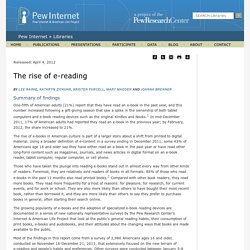
In mid-December 2011, 17% of American adults had reported they read an e-book in the previous year; by February, 2012, the share increased to 21%. The rise of e-books in American culture is part of a larger story about a shift from printed to digital material. Using a broader definition of e-content in a survey ending in December 2011, some 43% of Americans age 16 and older say they have either read an e-book in the past year or have read other long-form content such as magazines, journals, and news articles in digital format on an e-book reader, tablet computer, regular computer, or cell phone. Key findings: Prev Next. Don't Be Nice; Be Helpful - Peter Bregman. Ron* was up next.
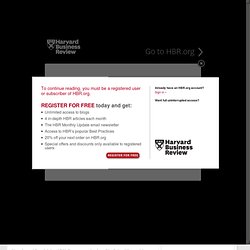
As a senior analyst in this investment firm — and a good one — he knew a lot about the company he was about to pitch to the management committee. He paused for a minute as he sorted through the pages of numbers in front of him and then he began to present his case. Even though Ron described himself as a numbers guy, he seemed to really enjoy this part of his job. He was meticulous in presenting his ideas and took pride in the depth of his analysis. Twenty minutes later, as the meeting ended, Laurie, the head of the firm, thanked him for his work, specifically remarking on his exhaustive research.
Everyone filed out except Laurie and me. “Oh my goodness,” she said, “What’s the best way to handle an analyst who drones on and on?” “Who?” “He’s a great analyst, a smart investor, and a really nice guy. “But you told him he did a great job!” “His analysis was great. “Have you told him?” “I’ve hinted but no, not specifically.” “Why not?” “I probably should.” Movers & Shakers 2012. April 10, 2014 Library Journal Library News, Reviews, and Views You are here: Home / People / Movers & Shakers 2012 / Movers & Shakers 2012 Movers & Shakers 2012 By LJ on March 13, 2012 This article was published in Library Journal.
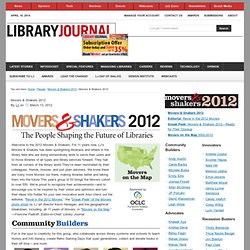
658.8 – Practical Marketing for Public Libraries. En/gage: a) to hold the attention of: <her work engages her completely> b) to induce to participate: <engaged the shy boy in conversation> If you are using social media to simply broadcast information about programs and events, you’re missing a huge opportunity to hold the attention of your community and to induce their participation.
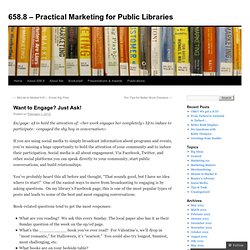
Social media is all about engagement. Via Facebook, Twitter, and other social platforms you can speak directly to your community, start public conversations, and build relationships. You’ve probably heard this all before and thought, “That sounds good, but I have no idea where to start!” One of the easiest ways to move from broadcasting to engaging is by asking questions. Book-related questions tend to get the most responses: What are you reading? We go beyond books, too: Oscars are tonight, what’s your pick for best pic? We get personal: What’s the best library program you’ve ever attended?